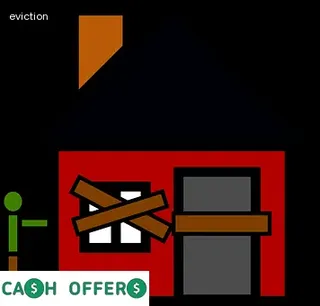Navigating the eviction process in Colorado can be tricky, and it's important for landlords to understand how long the entire process takes. While it ultimately depends on a variety of factors, such as if tenants are contesting their eviction, most evictions in Colorado will take between 30 to 60 days after filing.
In order to ensure a smooth process, expert landlords suggest that property owners should have an experienced attorney review all rental agreements before they’re signed and keep good records of payments and tenant violations throughout the duration of the lease. They should also make sure to follow all state laws when it comes to evicting tenants and give proper notice according to Colorado law.
Additionally, landlords should consider consulting with an attorney if any complications arise during the eviction process. By taking these steps, landlords can increase their chances of having a successful eviction in Colorado.

In Colorado, landlords may only terminate a tenancy for specific reasons. Tenants must be given an opportunity to correct the issue that sparked the eviction process or vacate the property.
Common reasons for evictions in Colorado include not paying rent on time, engaging in illegal activities on the property, damaging the property, and/or having too many occupants. It is important to note that according to Colorado state law, landlords are not allowed to evict tenants due to discrimination or retaliatory actions.
Before beginning the eviction process, landlords should educate themselves on their rights as well as their tenant’s rights. Understanding all of this information is key to ensuring a smooth eviction process that abides by state laws and regulations.
The Colorado eviction process follows a series of essential steps that must be completed in order for an eviction to take place legally. Landlords should first provide the tenant with a notice to vacate, which specifies the number of days remaining on the lease, and the reason for the eviction.
Once the notice period has expired, landlords must file a complaint with the court system and serve it to their tenant. Afterward, tenants have five days to respond to the complaint by filing an answer or motion to dismiss.
If they do not respond, landlords may file a motion for default judgment. The court can then conduct an uncontested hearing if all parties are in agreement, or a contested hearing if there is disagreement between landlord and tenant.
Finally, once the judge issues a writ of restitution, landlords can contact law enforcement officials who will help them regain possession of their rental property. By following these essential steps, landlords can ensure that their Colorado evictions are processed smoothly and quickly.

When landlords need to serve a tenant notice to comply, there are several strategies they can use. First and foremost, it is essential to research the relevant laws in the state of Colorado.
This will help landlords understand their rights and obligations when it comes to serving a tenant notice. Additionally, landlords should create a detailed document that outlines the reasons for the eviction notice and provide clear instructions on how tenants can comply with the terms of the agreement.
It is also important to follow all of the necessary steps outlined in Colorado law when serving an eviction notice. This may include providing written notices, filing documents with county courts, and giving tenants time to respond or fix any issues outlined in the notice.
Landlords should also ensure that all documents are signed properly and filed correctly to avoid any potential legal implications down the line. By following these tips, landlords can ensure that they are taking all of the necessary steps for a smooth eviction process in Colorado.
It is important for landlords to understand the Colorado eviction process and how to successfully ask for possession of property when evicting a tenant. Asking for possession of property is an essential step in the eviction process, and one that should not be overlooked.
Landlords should be aware of their rights as well as state laws, which can vary depending on the jurisdiction. It is beneficial to have a comprehensive understanding of what will be required when asking for possession of property during an eviction.
This includes understanding any applicable deadlines, filing necessary paperwork, and following proper procedures. Additionally, it is highly recommended that landlords consult an attorney or another qualified professional to ensure they are taking all necessary steps in the eviction process.
By understanding the Colorado eviction process and properly following procedures for asking for possession of property, landlords can help ensure a smooth eviction process and avoid potential legal issues down the road.

Colorado landlords must act swiftly to evict tenants who are in violation of their lease agreement. The eviction process can take anywhere from a few days to a few months, depending on the situation.
Expert landlords have several tips for ensuring the process moves along quickly and smoothly. First, make sure you have a legally enforceable lease agreement in place before renting out your property.
If the tenant is in violation of the lease, document it thoroughly and serve them an eviction notice as soon as possible. Additionally, landlords should research Colorado state laws to ensure they're following all applicable regulations when evicting tenants.
Finally, if necessary, be prepared to go to court in order to get permission for a writ of restitution for possession of property. This will allow you to regain possession of your property quickly and effectively.
By following these expert tips, landlords in Colorado can successfully retrieve possession of their property with minimal hassle.
Filing a complaint is the first step of the Colorado eviction process. This complaint must include all relevant information about the tenant, such as their name and address, and an explanation of why the eviction is necessary.
The landlord must also provide proof that they have served a notice to quit or pay rent to the tenant. After this complaint has been filed, the tenant will receive notification that they must appear in court on a specific date.
It is important for landlords to be aware of all local laws and regulations when filing a complaint, as failure to do so can result in delays in the eviction process. In addition, landlords should ensure that they are properly documenting all communication with tenants throughout this process, as it can make it easier when presenting their case in court.

When a landlord is attempting to evict a tenant, they must show evidence that the tenant has violated the lease agreement. Evidence may include unpaid rent, property damage, or any other issues that have occurred.
Landlords must be able to demonstrate to the court that these violations have taken place in order for an eviction to be successful. This could involve providing proof of payments received or not received, presenting photographs of damage done to the premises, and/or witness testimony from other tenants or neighbors who may have seen the violation.
Additionally, landlords should provide copies of all relevant documents including the lease agreement and any applicable notices as proof of their case. It is important for landlords to make sure that all necessary evidence is presented during an eviction case in order for it to be successful and for all parties involved in the eviction process to be treated fairly.
Terminating a tenant in Colorado with cause is an unfortunate but necessary part of being a landlord. Understanding the local laws and regulations involved in evicting tenants can help landlords navigate the process smoothly to ensure that all parties involved are treated fairly.
In order to legally terminate a tenancy, landlords must have valid legal grounds for eviction such as nonpayment of rent or lease violations. Once these grounds are established, landlords must provide their tenants with written notice informing them that they must vacate the premises within three days, which begins the Colorado eviction process.
If the tenant does not comply, then the landlord can file an eviction action with the court and serve it on the tenant. The court will then hold a hearing where both parties can present their cases before making a ruling.
It's important for landlords to understand their rights and obligations under Colorado law during this process to ensure that any eviction is handled correctly and efficiently so that everyone is able to move forward in an equitable manner.

In Colorado, landlords are required to follow certain rules and fill out forms in order to begin the eviction process. The first step is issuing a notice to the tenant, which can take the form of an Unconditional Quit Notice or a Pay Rent or Quit Notice.
The Unconditional Quit Notice requires that the tenant leave the premises within three days of receiving the notice, while the Pay Rent or Quit Notice gives them seven days to pay their overdue rent or move out. If neither action is taken, then landlords can file an eviction lawsuit at their local county courthouse.
After filing, tenants are served with a Summons and Complaint for Forcible Entry and Detainer, which includes details about when they must appear in court. Landlords must also give tenants written notice of their court hearing date before it takes place.
During this process, it is important for landlords to be aware of all relevant state laws governing evictions in Colorado and ensure that they are in compliance with them throughout the duration of the eviction process.
The Colorado eviction process is a complex legal procedure that can take some time to complete. It's important for landlords to understand the timeline of evictions in order to ensure a smooth transition while protecting their rights and interests.
In Colorado, the landlord must first provide written notice in order to begin the eviction process. This notice should include information about why the tenant is being evicted and how long they have to vacate the premises.
After this notice is served, if the tenant does not comply with it then the landlord can file an official complaint in court. If granted by a judge, a Writ of Restitution will be issued which authorizes law enforcement to physically remove any remaining tenants from the property.
The entire process can take anywhere from three weeks up to several months depending on how quickly all parties involved are able to respond and abide by any court orders or agreements. Being familiar with relevant laws and having professional legal counsel available can help expedite this timeline significantly so that landlords are able to secure possession of their property as soon as possible with as little disruption as possible.

Evictions are a difficult and time-consuming process, but they can be made smoother by following a few legal steps. Before beginning the eviction process in Colorado, landlords should review all relevant state statutes to ensure their actions comply with the law.
This includes understanding the notice requirements for different types of evictions and any local regulations that may apply. Additionally, landlords should consider consulting an attorney who specializes in landlord-tenant law to ensure their paperwork is complete and legally sound before filing it with the court.
Once this has been done, landlords can file the relevant documents with the court and provide notice to the tenant as required by law. After following these steps and allowing proper time for a response from the tenant, landlords can then move forward with the eviction process.
Although implementing these legal steps will require some extra effort upfront, it can help avoid costly disputes down the road that could prolong or even derail an eviction.
It is important to understand the laws in your state when it comes to eviction, as each state has different regulations and processes that must be followed. In Colorado, the eviction process is governed by Title 38 of the Colorado Revised Statutes, which outlines how a landlord can legally evict a tenant.
Specifically, landlords must provide tenants with a written notice of their intent to terminate the lease agreement and give them three days to vacate or pay any outstanding rent. If they do not comply, then landlords may proceed with an action for eviction in court.
Additionally, landlords must serve the tenant with a summons and complaint informing them of the impending court hearing. The time frame for this entire process can vary from case to case depending on the complexity of the issue, however it is typically completed within 30-60 days from start to finish.
It is important for both parties to be aware of their rights and obligations throughout this process so that it can remain as smooth and efficient as possible.

Starting an eviction process can be a lengthy and difficult process. It's important to be aware of the potential issues that could arise when beginning the eviction process in Colorado so that you can prepare ahead of time.
Expert landlords suggest having all documentation ready before starting an eviction, including the lease agreement, any notices sent, and other documents related to the tenant. Additionally, make sure that you are familiar with relevant state laws and regulations for evicting tenants in Colorado as well as any applicable local laws or ordinances.
You should also ensure that your eviction notice is filled out properly with all required information before sending it to your tenant. Finally, it's important to understand exactly how long the Colorado eviction process takes so you can plan accordingly and get ahead of any potential delays.
DoorLoop's services provide the expertise and resources landlords need to save time and money during the Colorado eviction process. DoorLoop simplifies evictions by providing experienced legal counsel and paperwork assistance to ensure landlords fully comply with state laws.
The team of experts also assists in understanding the process timelines, as well as staying up-to-date on recent changes to regulations, helping landlords complete the eviction process quickly and efficiently. In addition, DoorLoop offers additional services such as tenant screening, rent collection, background checks, property management software, and more.
With DoorLoop's help, landlords can confidently navigate the eviction process while saving money in legal fees and court costs.

DoorLoop is a leading provider of eviction solutions for landlords in Colorado. By using their services, you can significantly reduce the amount of time it takes to complete an eviction process.
DoorLoop's team of expert landlords provide fast and efficient solutions that streamline the eviction process while still adhering to local regulations. Through their easy-to-use interface, landlords can quickly access all relevant paperwork and save time by filing them electronically.
Furthermore, they offer advice and guidance on navigating the complexities of different types of evictions, ensuring that landlords get a smooth and timely resolution. With DoorLoop's solutions, landlords can be sure that they are getting the best possible outcome for their eviction cases.
Request a demo today to see how DoorLoop's services can make your next eviction faster and easier than ever before.
DoorLoop is an online platform that provides expert landlord insights to help portfolios on the market quickly and smoothly. The Colorado eviction process is designed to protect tenants’ rights while also protecting landlords’ interests.
It can be a lengthy process, but DoorLoop provides resources and information to streamline the entire eviction process. With instant access to local experts, landlords can easily find out how long it will take for an eviction in their area and what steps are needed for a successful outcome.
DoorLoop also helps landlords create rental agreements that comply with local regulations, making sure that all the paperwork is in order before filing an eviction notice. From start to finish, DoorLoop has everything needed for a smooth and stress-free eviction process no matter where you are in Colorado.

DoorLoop services offer significant advantages to landlords in Colorado who are going through the eviction process. It streamlines the legal paperwork, keeps all documents in one organized place, and offers an online platform for landlords to use that automates much of the process.
By signing up for DoorLoop services, landlords have access to experienced experts who can provide personalized advice on navigating the eviction process in Colorado. Additionally, landlords can get help with understanding their rights and responsibilities under state law as well as a simplified timeline outlining how long it typically takes for an eviction to be completed.
With DoorLoop's user-friendly platform and expert insights, landlords can make sure their eviction process is smooth and efficient so they can move forward quickly with their rental property management goals.
When facing an eviction case, it's essential to strategize your finances in order to ensure a smooth process. Expert landlords suggest that tenants should prepare for the financial repercussions of being evicted, such as covering legal and court fees, as well as having enough money to secure new housing.
Depending on the nature of the eviction case, these costs can quickly add up. Furthermore, knowing how long the Colorado eviction process takes is essential in order to plan and budget accordingly.
Generally, the process includes filing paperwork with the court system, followed by a tenant hearing which can take several weeks. The timeline may vary depending on factors such as location and severity of the eviction case.
It's important to stay organized and keep track of all documents related to your eviction case in order to avoid any delays or complications during the process. Being aware of all associated costs prior to beginning an eviction case will help tenants prepare financially and navigate their way through a successful outcome.
Evicting a tenant in Colorado is a process that may take some time and effort to complete. According to experts, the Colorado eviction process can range anywhere from two weeks up to six months or more depending on the circumstances.
A standard eviction process in the state of Colorado generally starts with the landlord providing written notice of termination, followed by filing a complaint with the court and obtaining an order from the court directing the tenant to vacate. If the tenant fails to comply with this order, then a writ of possession will be issued which allows for law enforcement officers to assist in removing tenants from their property.
Ultimately, landlords should be aware that they cannot evict tenants without first following proper legal procedure as outlined by state laws and regulations. By understanding how long it takes for an eviction to go through, landlords can better plan ahead and ensure a smooth eviction process if needed.

When an eviction notice is issued in Colorado, tenants are legally required to vacate the premises within a certain period of time. Colorado law stipulates that landlords must give tenants three days’ notice to vacate before beginning formal eviction proceedings.
This timeline can vary depending on the circumstances and type of lease agreement involved. During this period, landlords can attempt to negotiate or mediate with tenants in order to reach a mutually agreeable resolution outside of court.
If no resolution is reached, landlords may take the matter to court and file an action for possession of the property. Once the paperwork has been filed and served, tenants will have seven days to respond or contest the eviction in court.
If no response is received, then the court may grant judgment in favor of the landlord, allowing them to repossess their property and remove any remaining occupants. Ultimately, the Colorado eviction process can take anywhere from three days up to several weeks for a final decision from the court.
Expert landlords typically advise that both parties strive for a swift resolution as soon as possible in order to avoid costly delays and additional legal fees.
In Colorado, how long can a tenant go without paying rent before facing eviction? It all depends on the landlord. According to experts, some Colorado landlords will give their tenants more time than others before beginning the eviction process.
Generally speaking, however, tenants should expect to receive an official notice of eviction if they are more than 10 days late with their rent payments. From there, it may take anywhere from two weeks to several months for the eviction process to be completed.
It is important to note that each case is unique and can vary in terms of time frame and other factors. To ensure a smooth and timely process, tenants should establish clear communication with their landlords and work with them to find solutions that work for both parties.
Delaying an eviction in Colorado is not an easy task, but it can be done. As a landlord, it is important to understand the legal process involved in delaying an eviction and how long the process may take.
In Colorado, evictions must follow specific steps laid out by state law, including proper notification given to tenants and filing the appropriate paperwork with a court. The length of time for this process varies on a case-by-case basis, depending on factors such as availability of local court resources or tenant compliance.
To quickly delay an eviction, landlords should consider seeking assistance from legal counsel familiar with Colorado’s eviction laws. An experienced lawyer can advise what options are available and how best to proceed in order to ensure that tenants receive due notice and that all deadlines are met.
Additionally, landlords should review their rental agreement carefully prior to initiating the eviction process to make sure they have followed all necessary steps required by law. By understanding these processes and taking action promptly, landlords can successfully delay an eviction in Colorado while protecting their interests at the same time.
A: In Colorado, the eviction process typically takes between 20 and 30 days from when the landlord first serves the tenant with a Notice to Quit.
A: Generally, the eviction process in Colorado takes between one and two months from entering a Judgment to the County Sheriff carrying out the Default Judgments following a Trial.

A: The eviction process in Colorado from entering a Judgment to the County Sheriff carrying out the Default Judgments following a Trial can take anywhere from two weeks to two months, depending on the specific county court’s schedule.
A: The eviction process typically takes four to six weeks in Colorado if done correctly, from filing the complaint with the court to having the county sheriff carry out the default judgment.
A: The eviction process in Colorado typically takes between 10-60 days after the landlord mails a first-class notice of eviction due to criminal activity.

A: The typical length of an eviction process in Colorado from filing a Summary Judgment to obtaining a Jury Verdict and Damages for Substituted Service can vary widely, depending on the complexity of the case and other factors. Generally, however, it may take anywhere from several weeks to several months.
A: The length of time for an eviction process in Colorado can vary depending on the situation. Generally, from the filing of a Summary Judgment to obtaining a Jury Verdict and Damages for Substituted Service, the process can take anywhere from a couple of weeks to several months. If mediation is required, the process may take longer due to the need to meet with a mediator and both parties reaching an agreement. Expert landlords are usually able to carry out evictions smoothly and restore quiet enjoyment more quickly than other methods.
A: The length of time it takes to complete an eviction process in Colorado varies depending on the type of case and any associated legal proceedings. Generally speaking, an eviction can take between two weeks and several months from start to finish, including attorney fees, bankruptcy proceedings, and any impact on the tenant's credit.